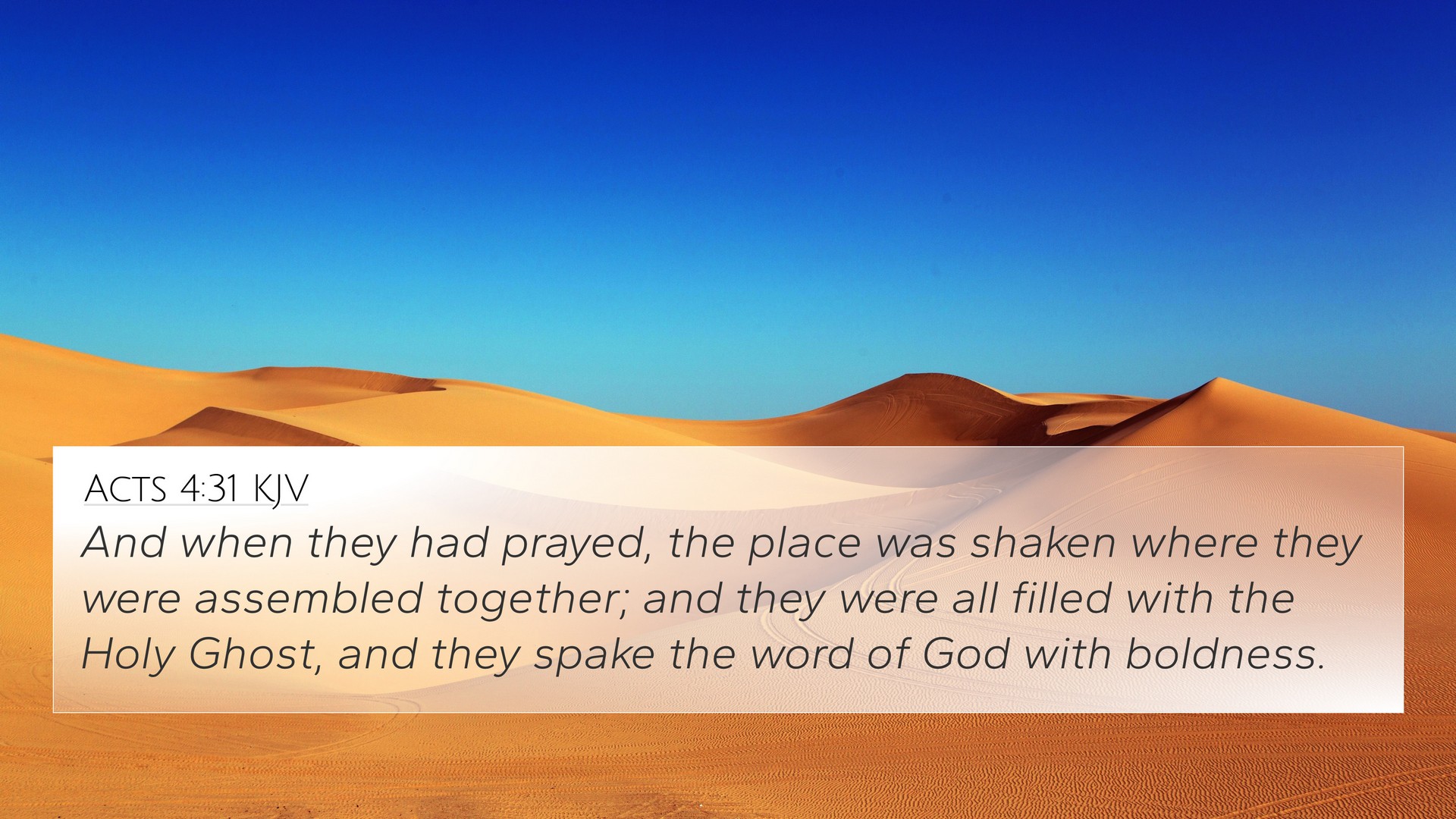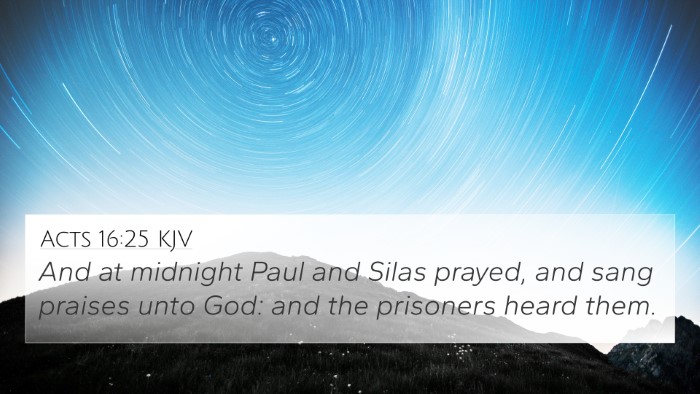Understanding Acts 4:31
Acts 4:31 states: "And when they had prayed, the place was shaken where they were assembled together; and they were all filled with the Holy Ghost, and they spake the word of God with boldness." This verse encapsulates a profound moment in the early church following the Apostles' initial experiences of persecution.
Meaning and Interpretation
Insights from various commentaries provide a deeper understanding of this verse:
- Matthew Henry: He emphasizes the significance of prayer in the believer's life. Henry notes that the fervent prayer of the early Christians leads to a palpable manifestation of God’s presence—illustrated by the place being shaken. This symbolizes divine affirmation and empowerment for the mission ahead.
- Albert Barnes: Barnes discusses the resultant filling of the Holy Spirit as an essential element in the life of believers. He connects this filling not merely as an individual experience but as a communal strengthening, which emboldens them to proclaim the gospel in adversity.
- Adam Clarke: Clarke elaborates on the miraculous nature of the moment, arguing it demonstrates God’s active involvement in the church. He points out that the boldness in speaking the word of God directly correlates to the filling of the Holy Spirit, underscoring the importance of divine empowerment in evangelism.
Key Themes
This verse touches a number of key themes in the New Testament, which can be explored further:
- Prayer and Community: The unity in prayer is highlighted as they sought God’s assistance together, demonstrating the strength found in collective faith.
- The Holy Spirit: The concept of being filled with the Holy Spirit is crucial, indicating the necessity of divine influence for effective ministry.
- Boldness in Witness: The bold proclamation of God’s word showcases the transformational effect of spiritual empowerment on believers, urging them to communicate their faith without hesitation.
Cross-References
To deepen the understanding of Acts 4:31, several relevant cross-references can be explored:
- Acts 1:8: "But ye shall receive power, after that the Holy Ghost is come upon you: and ye shall be witnesses unto me..." - This verse links the empowerment from the Holy Spirit to witnessing, setting the stage for what happens in Acts 4:31.
- Luke 11:13: "If ye then, being evil, know how to give good gifts unto your children: how much more shall your heavenly Father give the Holy Spirit to them that ask him?" - Here, the promise of the Holy Spirit is further affirmed as a gift from God to those who seek Him.
- Acts 2:4: "And they were all filled with the Holy Ghost, and began to speak with other tongues, as the Spirit gave them utterance." - This parallel highlights an early instance of being filled with the Holy Spirit, emphasizing its ongoing role in the lives of the apostles.
- Hebrews 13:6: "So that we may boldly say, The Lord is my helper, and I will not fear what man shall do unto me." - This verse reinforces the theme of boldness in faith amid external challenges.
- Acts 5:29: "Then Peter and the other apostles answered and said, We ought to obey God rather than men." - This passage illustrates the continued boldness of the Apostles in proclaiming their faith irrespective of opposition.
- John 14:26: "But the Comforter, which is the Holy Ghost, whom the Father will send in my name, he shall teach you all things, and bring all things to your remembrance, whatsoever I have said unto you." - This scripture connects the teaching role of the Holy Spirit, enhancing understanding of the Apostles' actions in Acts 4:31.
- Romans 8:26: "Likewise the Spirit also helpeth our infirmities: for we know not what we should pray for as we ought: but the Spirit itself maketh intercession for us..." - The influence of the Spirit in guiding prayer is illustrated here, connecting to the communal plea in Acts 4:31.
Concluding Thoughts
Acts 4:31 serves as a powerful reminder of the importance of prayer, community, and divine empowerment through the Holy Spirit. The thematic connections illustrated through cross-references highlight the intricate web of scripture that supports and enriches understanding of early church practices. These connections between Bible verses help to form a comprehensive biblical narrative that underscores the value of cross-referencing biblical texts for deeper insights.
Tools for Bible Cross-Referencing
For those interested in further exploring the connections between scripture, the following tools can be useful:
- Bible concordance
- Bible cross-reference guide
- Cross-reference Bible study techniques
- Bible reference resources
- Bible chain references
This approach helps in identifying connections between Old and New Testament writings, providing a detailed framework for study and meditation.















